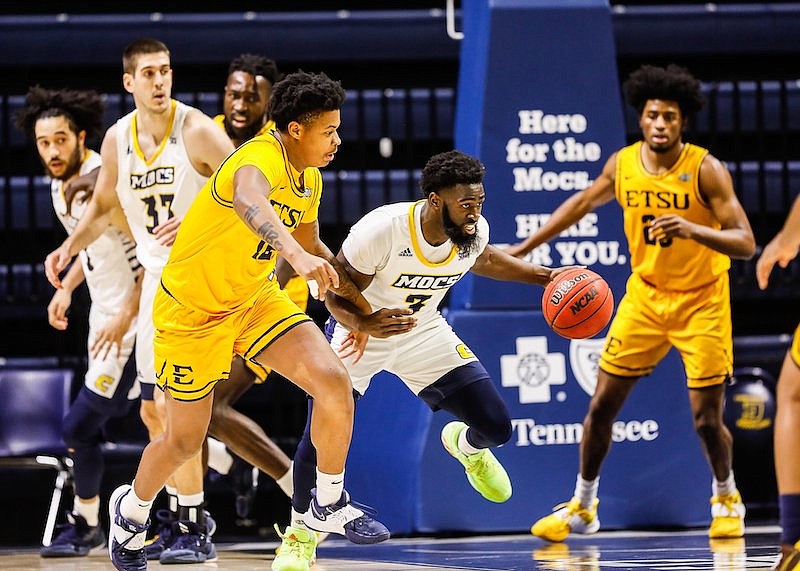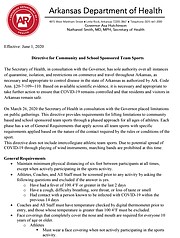NASHVILLE - Upset Tennessee Senate Republicans are urging the heads of state universities and colleges to stop student-athletes from kneeling during the national anthem after a Feb. 15 basketball game in Chattanooga.
At that game, East Tennessee State University players "took a knee" during the anthem before their match with the University of Tennessee at Chattanooga.
After fuming over the event for days, the entire 27-member Senate Republican Caucus sent an identical letter earlier this week to ETSU President Brian Nolan, UTC Chancellor Steven Angle and seven other presidents or chancellors.
"During athletic competitions, our student-athletes represent not only themselves, but also our universities and all the citizens of this state, many of whom view this form of protest as offensive and disrespectful to the very thing our national anthem represents," states the GOP lawmakers' letter, the handiwork of Senate Education Committee Chairman Brian Kelsey, R-Germantown.
The letter adds that "while we do recognize our student-athletes may express their own views on a variety of issues in their personal time, we do not condone any form of protest that could be viewed as disrespectful to our nation or flag while they are representing our state universities. When they don the jersey of a Tennessee university, they step out of their personal roles and into the role of an ambassador for our state."
GOP lawmakers emphasized that "to address this issue, we encourage each of you to adopt policies within your respective athletic departments to prohibit any such actions moving forward."
Beginning in 2016, a number of college and professional athletes have protested systemic racism and police brutality, particularly against Black citizens, by bending on one knee while "The Star-Spangled Banner" is played. It was first popularized by Colin Kaepernick in the National Football League. Most of the ETSU basketball team is Black, and the entire GOP Senate caucus is white.
A spokesperson for UTC referred a reporter to a statement issued by UT system spokesperson Tiffany Carpenter. In it, Carpenter stated, "We respect the brave men and women who serve and have served in our armed forces, the commitment of legislators Tennesseans have voted to office and our student-athletes who represent our institutions."
Carpenter said officials are now "engaged in conversations across the system about how to move forward in a way that shows that commitment and respect for all."
Sens. Bo Watson, R-Hixson, Todd Gardenhire, R-Chattanooga, Mike Bell, R-Riceville and Janice Bowling, R-Tullahoma, were among those signing on to the letter. None of the 33-member chamber's five Democrats did.
Watson said the student-athletes "certainly have a right to [protest], nobody's saying they don't have a right to do that. But exercising your right, your protest, has potential consequences to it. For example, you can yell fire in a theater and still be arrested for it. But you have a right to do that.
"When you're a scholarship athlete, you sign for all intents and purposes a contract to abide by the code of conduct per se that the university has established," Watson added, citing as an example that "certain teams will say if you travel with our football team you're going to wear a blue blazer and a white shirt and an orange tie - you're going to travel in that."
Students have the right to object and say "freedom of expression should allow me to wear whatever I want to wear, " Watson said, adding, "Sure, you can, but you're just not going to travel with the team."
The senator said "standing for the Pledge of Allegiance can be part of a school's code of conduct and says that this school, this is what we do. If that's not for you, that's fine. That's fine. Just not at this school. So I don't think it's inconsistent with anyone's First Amendment right. It's just consistent with this is the code of conduct we have at this institution."
Rep. Yusuf Hakeem, D-Chattanooga, who is Black, disagreed, noting "all of us need to realize this is 2021. And the pain and frustration of a perceived police brutality in law enforcement has to be demonstrated in some way."
Hakeem said in his "knowledge and understanding, to kneel is not a slap at the national anthem or our flag. Rather than just sitting or doing something like that, it's a gesture to acknowledge the pain and suffering that people are going through. And we in positions of leadership need to acknowledge what has happened and is happening in regards to the relationship with law enforcement and communities of minorities.
"Black Lives Matter," Hakeem said. "Own up to what we have allowed to happen over the years."
Hakeem also called it "unfortunate that an expression of frustration and pain should be interpreted as disrespect for the flag of our country. Families of the same people who are kneeling, both Black and white, have served in our military, have served in government, paid taxes. So I'm going to use the term: Get over it, and let's move forward."
In a statement, the American Civil Liberties Union-Tennessee said "freedom of expression does not cease to exist if you walk onto a basketball court – especially if you attend a public university. Your ability to protest peacefully does not disappear because of a scholarship, and your First Amendment rights are certainly not tied to lawmakers' reactions to the content of your speech."
The ACLU-Tennessee said "such policies would be unconstitutional. The U.S. Supreme Court has long held that neither public schools nor legislators can force their definition of patriotism on students by requiring students to participate in compelled speech. These students can say what they want as long as it does not disrupt the learning process."
Contact Andy Sher at asher@timesfreepress.com or 615-255-0550. Follow him on Twitter @AndySher1.


